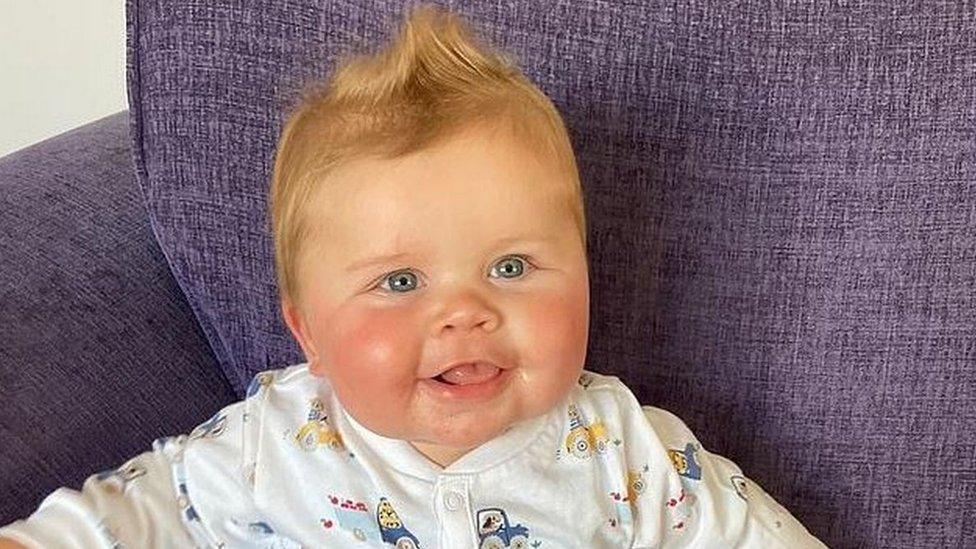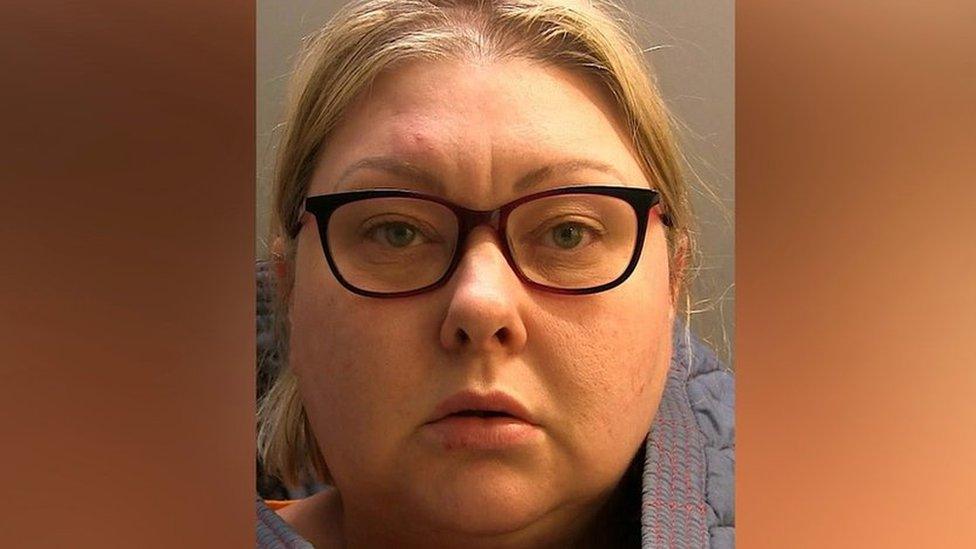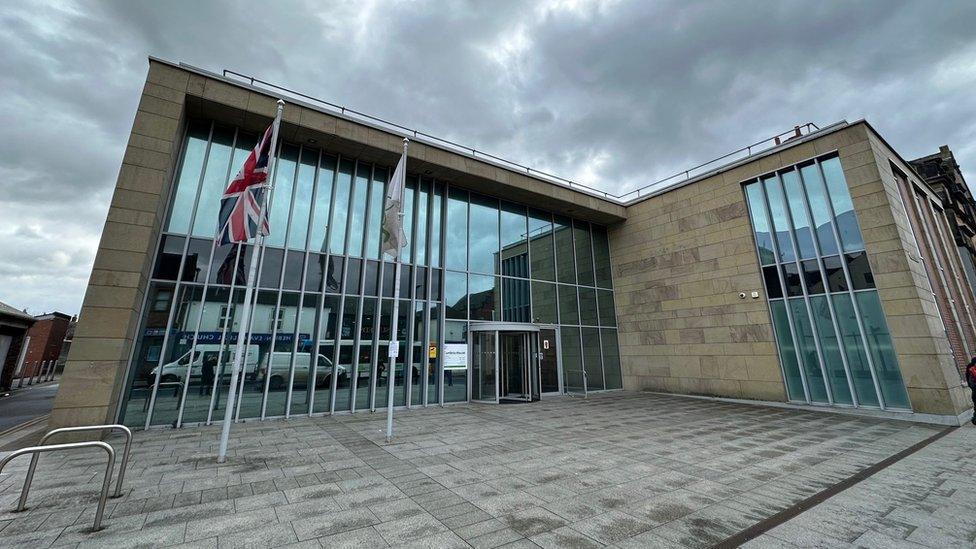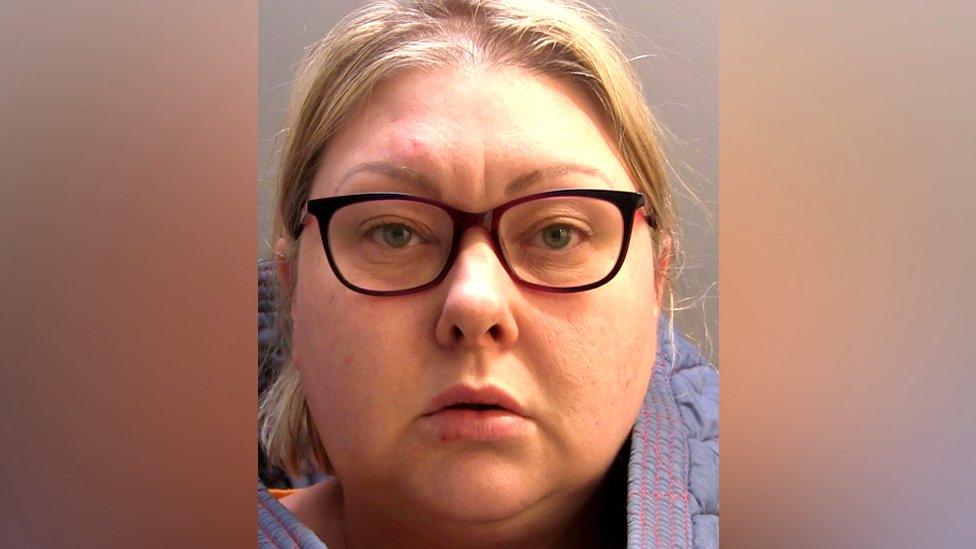Leiland-James Corkill review found 'holes' in adoption system
- Published

Leiland-James Corkill was one year and 17 days old when he died after being shaken by Laura Castle
A review into the death of a baby boy murdered by the woman who wanted to adopt him found "holes" in the system, an inquest has heard.
Leiland-James Corkill was fatally shaken by Laura Castle at their home in Barrow-in-Furness on 6 January 2021.
Cumbria assistant coroner Dr Nicholas Shaw said he wanted to consider the circumstances of Leiland-James being placed with Castle.
Nicki Pettitt, who reviewed the case, said national changes had been made.
Castle was jailed for life with a minimum term of 18 years after being found guilty of murdering the 13-month-old, while her husband Scott Castle was cleared of causing or allowing Leiland-James' death.

Laura Castle had admitted manslaughter but was found guilty of murdering Leiland-James
The inquest at Cumbria House heard the boy was taken into care by the then-Cumbria County Council two days after being born at West Cumberland Hospital in Whitehaven in December 2019.
He was placed with the Castles in August 2020, but was forcefully shaken by Castle on 6 January 2021 weeks after she told Cumbria County Council social workers she did not think she loved him.
Ms Pettitt, who carried out a child safeguarding practice review, said all the council's adoption procedures were followed in the Castles' case, but she found "holes" in the system.
She said people who applied to be adoptive parents had to be approved by a panel based on information provided through medical assessments, references and police checks.
They also had to undergo training and group sessions, and once provisionally approved, a panel would again have to decide their case when a potential match was found, with the final sign-off being made by an "agency decision-maker".

The two-day inquest is being held at Cumbria House in Carlisle
Ms Pettitt said the first "learning" was around health assessments which relied on people being "open and honest" with doctors.
The main health assessment was completed when the couple were initially approved, 11 months before they matched with Leiland-James, and the system did not allow for people's physical and mental health to be updated, Ms Pettitt said.
She also found the financial probe relied on adopters' "honesty" and bank statements, which did not reveal how much debt people were in and the "stress" felt by families.
Ms Pettitt said the Castle's financial assessment was also done before Mr Castle was put on furlough because of the coronavirus pandemic, so when Leiland-James was placed with them, decision makers did not know the financial pressure the family was under at that time.
'Lack of urgency'
Ms Pettitt said Leiland-James' introduction to the Castles was "swifter than ideal", in part because of the pandemic and "concerns about contamination between houses".
But she said it initially seemed to go well and a "lot of work was done about expectations" with the Castles.
Ms Pettitt said social workers carried out five "statutory" visits as required but there was a question over whether that was "sufficient", especially when concerns were raised about Leiland-James appearing unsettled and when, in November, Castle told a social worker she was worried she did not love him.
He was also seen by multiple social workers, but Ms Pettitt said it should have been one person following the case through.
Dr Shaw said there also seemed to be a "distinct lack of urgency" from social workers after Castle's comments in November, and Ms Pettitt agreed.
She said Leiland-James' case was "not seen in anyway as a child protection issue" and there needed to be a "timelier response" when the placement appeared to be at risk of breaking down.
'Lack of joy'
Martin Birch, director of children and families at Cumberland Council, one of two authorities to replace Cumbria County Council, previously told the inquest lessons had been learned by the case and changes made.
Social worker Penny Hindle, who worked with the Castles on their adoption, said the couple had always wanted children but struggled to conceive naturally.
She said all the references and checks made when they were initially approved in May 2019 were "extremely positive" and "they appeared to be fully co-operative".
She said she "never had any cause for concern about Leiland-James's safety", but was worried that the Castles "didn't have the emotional bond" she would have expected.
Ms Hindle said in December 2020 she would not have supported an application to fully adopt Leiland-James due to the bonding issues, but therapeutic work was scheduled to help the family.
She said she sensed a worrying "lack of joy" from Castle, who said Leiland-James "didn't like living with them".
But, Ms Hindle said, Castle told her Leiland-James was "not going anywhere because their extended family were very fond of him", and both Castles said they "didn't want him to go and wanted to work" on their relationship with him.
'Economic with truth'
Dr Shaw said Leiland-James' case needed to be "remembered nationally" as, while he could "not understand what the Castles were doing or why", it served as a "reminder" to social workers "to be aware".
He said the Castles had been "economic with the truth" and "appeared as loving parents", adding they "may have tried to be loving parents but they couldn't cope with Leiland-James and Leiland-James couldn't cope with them".
He said he did "not know" how you could "stop someone from pulling the wool over the panel's eyes" if they were determined to do so.
The inquest continues.

Follow BBC Cumbria on Facebook, external, X (formerly Twitter), , externaland Instagram, external. Send your story ideas to northeastandcumbria@bbc.co.uk, external.
Related topics
- Published29 April 2024

- Published29 June 2023

- Published28 July 2022

- Published25 May 2022

- Published17 May 2022
